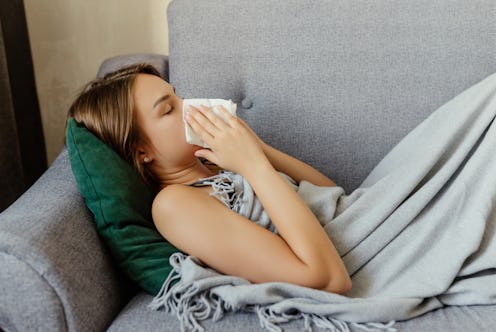Life
Here's What To Do If Allergies Are Messing With Your Sleep

Seasonal allergies might not be the most serious malady, but they’re persistent, irritating, and can negatively impact many different aspects of your life — including your appetite, work performance, stress levels, and sleep schedule. In fact, if you find you struggle to snooze during the springtime and summer months, it may be because your allergies are messing with your sleep.
“If you have allergic symptoms during the day, and you are having trouble sleeping at night, it is most likely that the histamine being produced is causing your brain to stay on high alert,” Dr. Jim LaValle, a clinical pharmacist and board certified clinical nutritionist, tells Bustle. As Healthline reported, histamine is the chemical compound your body releases in response to injuries or allergic reactions — meaning, it’s how your body responds to common triggers during allergy season, like pollen and dust mites. Dr. Steven Olmos, a Xlear expert, and physician DDS board-certified in sleep-related breathing disorders, explains that some of common allergy symptoms include sneezing, watery eyes, congestion, a dry mouth, and snoring.
Unsurprisingly, these symptoms can make getting eight hours of restful sleep — or any quality shut eye at all — a difficult task. “Almost half of people who suffer from seasonal allergies experience sleep difficulties. Allergy sufferers take longer to fall asleep at night, and wake up more often during sleep that those without allergies,” Dr. Holly Phillips, a board-certified general internist and RxSaver by RetailMeNot’s medical expert, says. She adds that “daytime sleepiness, memory problems, and mood disturbances like depression” are clear signs your allergies are negatively affecting your sleep-wake cycle.
Both Phillips and Olmos warn that allergic rhinitis can especially disrupt sleep. According to the National Sleep Foundation, this occurs when allergens cause inflamed, irritated, and swollen nasal passages. In fact, allergic rhinitis is linked to obstructive sleep apnea (OSA), which causes pauses in breathing or periods of shallow breathing during the night.
If you find allergy season is making it near impossible to catch decent shut eye, there are a few things you can try in order to make the sneezing, stuffiness, and itching a little more bearable. First and foremost, LaValle suggests to shop for three, over-the-counter products: A nasal spray and a nasal wash to control allergy symptoms, as well as melatonin supplements to aid with sleep.
Phillips says allergy-proofing your home by using dust mite covers and keeping your windows closed is another way you can prevent outside allergy triggers from making their way into the bedroom. She adds that you should “take off outside clothes when you walk in the door to prevent bringing in allergens.” Also, investing in an air purifier may also help curb the symptoms of seasonal allergies.
Along with these allergy-specific expert tips, it’s never a bad idea to check in with your sleep routine, and make sure you are practicing good sleep hygiene in general. Allergy season can be a pain in the butt, especially when it comes to falling and staying asleep. But, with proper preparation and products, you’ll be snoozing soundly in no time.
This article was originally published on